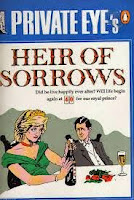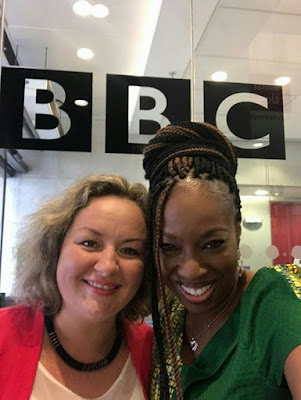Heir of Sorrows
 Sadly, I have never been much of a fan of Prince Charles. I have always found him a bit of a disappointment, his much ridiculed eco-activism, his rather grubby affair with Camilla are elements which were only compounded by a childhood formed by Private Eye's Heir of Sorrows series and Spitting Image probably didn't help.
Sadly, I have never been much of a fan of Prince Charles. I have always found him a bit of a disappointment, his much ridiculed eco-activism, his rather grubby affair with Camilla are elements which were only compounded by a childhood formed by Private Eye's Heir of Sorrows series and Spitting Image probably didn't help.Despite my prejudices, I could not help but be impressed and deeply moved by what the Prince said and did in Ireland this week. I mean deeply moved; especially by his profound words at Mullaghmore yesterday. I was pretty stunned by his meeting with Gerry Adams. No doubt the Prince knows that Adams' position is the result of a rather shabby political deal which was stitched together and has put the ringmasters of the murderous IRA into senior political roles and garlanded them with civilised respectability. Respectability that has provided them with a political vehicle to push abortion and Same Sex Marriage.
No doubt Charles' anguish at the loss of the Uncle who was, to all intents and purposes, the Grandfather he never knew, is still very keen. Yet he has sought reconciliation on this trip and, to my mind, really taken the lead here. You can read the whole of his speech at Mullaghmore here, but these bits particularly touched my heart:
...we should never forget that our acquaintance has been long; and we can turn that knowing into something new and creative. We need no longer be victims of our difficult history with each other. Without glossing over the pain of the past, we can, I believe, integrate our history and memory in order to reap their subtle harvest of possibility. Imagination, after all, is the mother of possibility. Let us, then, endeavour to become the subjects of our history and not its prisoners.
Ireland has had more than its fair share of turbulence and troubles. Those directly affected do not easily forget the pain. Recent years have shown us, though, that healing is possible even when the heartache continues.
In August 1979, my much-loved great uncle, Lord Mountbatten, was killed alongside his young grandson and my godson, Nicholas, and his friend, Paul Maxwell, and Nicholas’s grandmother, the Dowager Lady Brabourne.
At the time I could not imagine how we would come to terms with the anguish of such a deep loss since, for me, Lord Mountbatten represented the grandfather I never had. So it seemed as if the foundations of all that we held dear in life had been torn apart irreparably.
Through this dreadful experience, though, I now understand in a profound way the agonies borne by so many others in these islands, of whatever faith, denomination or political tradition.[I think this is a particularly difficult insight, and for a person to leave aside their personal agony to empathise with the similar agony suffered by strangers shows great emotional maturity; perhaps a maturity forged in the furnace of his own personal experience of tragedy throughout his life?]
Despite the tragedy of August 1979, the memories that Lord Mountbatten’s family have of Classiebawn Castle and Mullaghmore, going right back to 1946, are of great happiness. I look forward to seeing, at last, the place that he and they so loved and to meeting its inhabitants.
Many of them showed the most extraordinary outpouring of compassion and support to both Lord Mountbatten’s and Paul Maxwell’s families in the aftermath of the bombing. Their loving kindness has done much to aid the healing process.
A number of us will also gather in St. Columba’s Church at Drumcliffe, “under bare Benbulben’s head,” for an ecumenical service of peace and reconciliation. The poet Yeats, who is of course buried at Drumcliffe, once wrote:
“And I shall have some peace there, for peace comes dropping slow.”
As a grandfather now myself, I pray that his words can apply to all those who have been so hurt and scarred by the troubles of the past, so that all of us who inhabit these Atlantic islands may leave our grandchildren a legacy of lasting peace, forgiveness and friendship.And this last bit touched me too. The wisdom that comes with age and prioritises peace over self-importance or righteousness. That is willing to be humble in order to court reconcilliation. That wisdom is something I long for, although I do not know how to cultivate it in my own life. Perhaps it only comes with age? I pray that the pain and suffering in my heart will burn out and, in a similar way, lead to a hunger for peace and reconcilliation that puts love before the pain I feel.
Charles has made mistakes, just as we all have, although his have been made under the glare of public scrutiny, (thank God my own mistakes have not been) and in the context of a life lived in unimaginable privilege. But I can't help but feel, though we might view such privilege with envious eyes, the reality of a life lived has not been shielded from sorrow because of that privilege. Indeed, what comfort can such material wealth be in the face of human, personal tragedy? How impossible must it be to deal with personal tragedy in the glare of constant intrusive media attention? Through this visit I feel I have glimpsed the wisdom and intellect of the man in a way I have not done before, and I am humbled and impressed by what I see.
 |
| A young Prince Charles with his beloved uncle. |



Comments
Post a Comment